

MOOC Professors Claim No Responsibility for How Courses Are Used - Wired Campus. Robert Ghrist teaching at the U. of Pennsylvania.
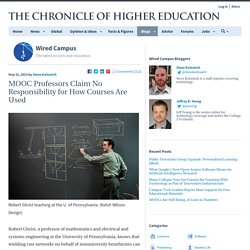
(Kelsh Wilson Design) Robert Ghrist, a professor of mathematics and electrical and systems engineering at the University of Pennsylvania, knows that wielding vast networks on behalf of nonuniversity benefactors can be tricky business. Mr. Ghrist specializes in applied topology, an abstract math field. In practice, topological math can help someone harness huge collections of sensory inputs—like those collected by cellphones, for example—to model large environments and solve problems.
The Department of Defense has enlisted Mr. “I have long ago dealt with the issue of: What if something I create is put to bad use?” That ethical dilemma became relevant to Mr. A group of philosophy professors at San Jose State University last month raised concerns to Michael Sandel, a government professor at Harvard, for his offering a MOOC through another provider, the nonprofit edX.
Despite courtship Amherst decides to shy away from star MOOC provider. After months of wooing and under close scrutiny, edX was rejected this week by Amherst College amid faculty concerns about the online course provider's business plans and impact on student learning.
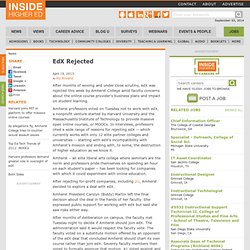
Amherst professors voted on Tuesday not to work with edX, a nonprofit venture started by Harvard University and the Massachusetts Institute of Technology to provide massive open online courses, or MOOCs. In interviews, professors cited a wide range of reasons for rejecting edX -- which currently works with only 12 elite partner colleges and universities -- starting with edX's incompatibility with Amherst’s mission and ending with, to some, the destruction of higher education as we know it. Amherst – an elite liberal arts college where seminars are the norm and professors pride themselves on spending an hour on each student’s paper – has been looking for companies with which it could experiment with online education.
Education/Transformation « figuringfifty. Since earning my MA in Educational Psychology, more than 20 years ago, I’ve taught in many different contexts and I’ve spent a good portion of my time thinking about how people think and learn.
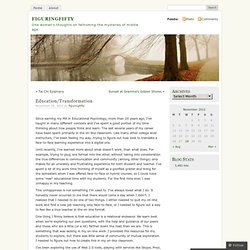
The last several years of my career have been spent primarily in the on-line classroom.
5 education providers offering MOOCs now or in the future. Massive open online courses (MOOCs) have become a surging trend in higher education, and traditional academic programs are scrambling to figure out where that trend is headed.
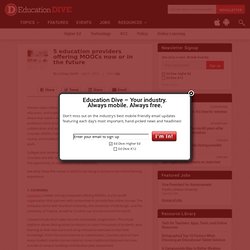
These virtual courses are taught by accredited professors from around the world to disseminate content, inspire collaboration and assess students' work. Academic Room. 50 Top Sources Of Free eLearning Courses. Whether you are looking for a master’s degree program, computer science classes, a K-12 curriculum, or GED study program, this list gives you a look at 50 websites that promise education for free.
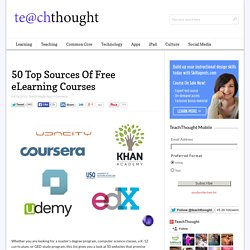
From databases that organize over 1,000,000 students throughout 16 universities, to a small library of documents for those interested in history, the opportunities for free online learning continue to expand as the Internet becomes a crucial component in education. 1. UMass Boston Open Courseware The UMass courseware offers a broad range of classes in areas like psychology, biology, early education, political science, history, mathematics, and others. KZO's Top 25 Must Read Blogs About eLearning. As a slew of new eLearning practices make their way onto the scene, it can often be difficult to keep up with the emerging trends.
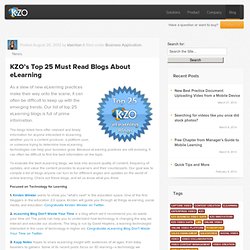
Our list of top 25 eLearning blogs is full of prime information. The blogs listed here offer relevant and timely information for anyone interested in eLearning, whether you’re a content producer, a platform user, or someone trying to determine how eLearning technologies can help your business grow. Because eLearning practices are still evolving, it can often be difficult to find the best information on the topic. To evaluate the best eLearning blogs, we took into account quality of content, frequency of updates, and value the content provides to eLearners and their counterparts. Teacher 2.0. OpenSesame. Classroom 2.0. 501(c)(3)U - The Online University for Nonprofits. Studying Teaching and Learning. Sugata Mitra: The child-driven education.
KZO's Top 25 Must Read Blogs About eLearning. All-You-Can-Eat-Education for $30 a Month. The Crisis in Higher Education. A hundred years ago, higher education seemed on the verge of a technological revolution.
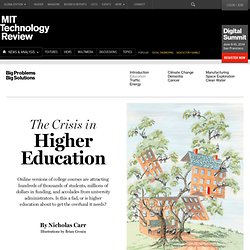
The spread of a powerful new communication network—the modern postal system—had made it possible for universities to distribute their lessons beyond the bounds of their campuses. Anyone with a mailbox could enroll in a class. Frederick Jackson Turner, the famed University of Wisconsin historian, wrote that the “machinery” of distance learning would carry “irrigating streams of education into the arid regions” of the country. Sensing a historic opportunity to reach new students and garner new revenues, schools rushed to set up correspondence divisions.
By the 1920s, postal courses had become a full-blown mania. The hopes for this early form of distance learning went well beyond broader access.
Translating. Online Language Education with private teachers. Great Video Lessons from Great Teachers. Shared Learning Collaborative Developer Community. InBloom Scenarios inBloom talked to nearly 800 educators about the way they work today and the challenges they face in the classroom.
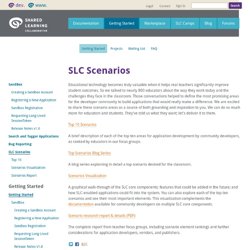
Those conversations helped to define the most promising areas for the developer community to build applications that would really make a difference. These scenarios are available here as a source of both grounding and inspiration to you. There is so much more to be done for educators and students. They’ve told us what they want; let’s deliver it to them. Scenarios Visualization A graphical walk-through of the inBloom core components; features that could be added in the future; and how inBloom-enabled applications could fit into the system. Scenario research report & details (PDF) The complete report from teacher focus groups, including scenario element rankings and further considerations for application developers, vendors, and publishers.
Making Online Courses. Business Models. Online Education. UPDATE: we're doing a live, updated MOOC of this course at stanford-online July-2014 (not this Coursera version).
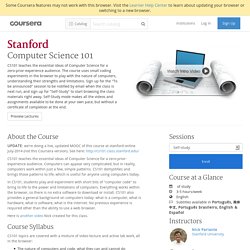
News. Free Online Classes. 450 Free Online Courses from Top Universities.
Conversation Club.